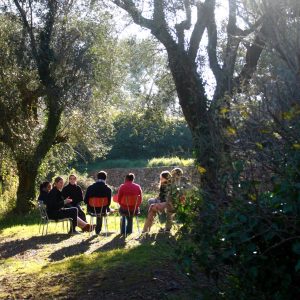9.2 What is a Community of Practice

“It is only through a give and take with others and by confronting the challenges they pose that critical reflection can be promoted” (Boud, 2001 p.14-15)
Video: Where Good Ideas Come From
To learn about where good ideas come from watch the video below by Steve Johnson at Riverhead Books [4:06].
After watching and reading the above content, it is important to have a shared understanding of what we mean when we refer to a community of practice. “The College of Early Childhood Educators (2018, p. 2)” references the communities of practice definition by “Wenger et al. (2002)” as “a group of professionals who share a common concern or passion about a practice topic and who wish to learn how to improve this area of practice by communicating and collaborating with each other regularly over time.” Wenger (1999), states there are three main elements that make a community of practice different from other groups: the domain is the connection between the group and there is some commitment to a shared competence that makes it different than a club or group of friends. This community is the second element. This means the group is engaging in a relationship to help learn from one another and finally the third element is the practice . This is the practitioner looking to share their experience around a sustained problem or seeking solutions. Communities of practice often are more formalized but not necessarily formal . They provide a time and space and a protocol for coming together. A community of practice can have members who come in and out of the group but usually a core group exists to help move the interests of the group forward through solutions and practice.
Sources
Boud, D. (2001). Using journal writing to enhance reflective practice. New Directions for Adult and Continuing Education, 90, 9-17. https://doi.org/10.1002/ace.16
College of Early Childhood Educators (2018). Communities of practice. https://www.college-ece.ca/en/Documents/CPL%20Resource-Communities-Of-Practice.pdf
Wenger, E. (1999). Communities of Practice. Learning, Meaning and Identity. Cambridge: Cambridge University Press.
Wenger, E., McDermott, R., & Snyder, W. (2002). Cultivating Communities of Practice: A Guide to Managing Knowledge. Boston: Harvard Business School Press.

